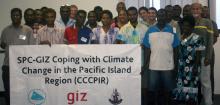Fisheries & Climate Change Workshop

The Vanuatu Fisheries Department, the Secretariat of the Pacific Community (SPC), AusAID GIZ, and Vanuatu’s National Advisory Board on Climate Change & Disaster Risk Reduction are supporting and have held a 2-day workshop this week on Thursday 30th and Friday 31st to help stakeholders in the fisheries and aquaculture sector identify priority adaptations to climate change.
The workshop is being attended by staff from the Vanuatu Fisheries Department, other government departments non government organizations, tourism operators, community fishermen’s associations and aquaculture partners. Participants have learned about the effects of global warming and ocean acidification on the ecosystems and stocks supporting fisheries and aquaculture, and the consequences for economic development, food security and livelihoods.
‘The aim of the workshop is to determine how best to build the resilience of coastal communities, and enterprises based on tuna and aquaculture, to climate change’, said the Director of the Fisheries Department, Moses Amos. ‘We would like all stakeholders to identify adaptations that minimize the risks posed by climate change, and maximize the opportunities’, he said.
Participants heard how some fisheries resources are expected to be losers as the climate changes, and that others will be winners. Some countries may have more tuna in their exclusive economic zones as these fish are redistributed progressively to the east due to climate change.
Another important message at the workshop is that continued degradation of coral reefs due to increases in coral bleaching and ocean acidification are expected to reduce the productivity of coastal fisheries by 20 percent by 2050.
‘This will reduce the amount of coastal fish available for food security’, said Christopher Arthur, Principal Fisheries Officer at the Fisheries Department. ‘But our most immediate challenge is to provide access to more fish for our growing population so that we can all eat enough fish for a healthy lifestyle’, he said.
‘The gap between how much fish we need for our food security and how much fish coastal habitats can provide is widening’, said Arthur. ‘We need to manage our coastal fish habitats and stocks well to reduce the size of this gap, and then find ways to fill the gap so that we can continue to eat the amount of fish we should’, he said.
Workshop participants learned about some climate change management and adaptation options are already used in Vanuatu to increase access to fish – inshore fish aggregating devices (FADs) and backyard pond aquaculture – and are practical ways to fill the widening gap. These strategies are effective adaptations to climate change because FADs will help supply fish as reefs degrade and aquaculture may be favoured by the projected changes in rainfall.
‘SPC, GIZ and other partners are assisting the Fisheries Department to implement these ways of increasing access to fish’, said Moses Amos. ‘Tuna caught by communities around FADs will need to provide most of this fish but aquaculture will help supply fish for people with limited access to tuna’, he said.
Moses Amos also emphasized that such win-win adaptations – those that supply fish for the food security of Vanuatu’s growing population and which promise to increase access to fish as the climate changes – are prime investments for the nation’s development partners.
